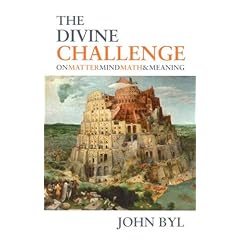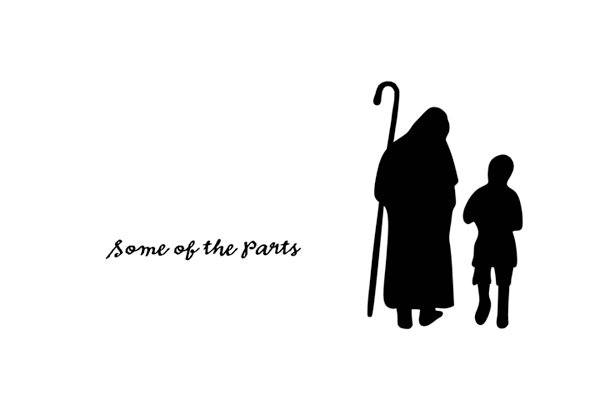A couple of months ago I gave a presentation entitled
"Is belief in divine creation rational?", which you can listen to on-line.
In that talk, I concentrated on one particular line of argument. Consistent materialists ultimately have nothing to say to us - because consistent materialism can easily be shown to be unable to explain the basis for the very acts of rational discourse and logical argumentation. The very manner in which they go about their business - assuming before they begin in the reality of consciousness, minds and rationality - refutes them. Turning this around, we have a solid proof for the reality of God who has made us in his image, the so-called "transcendental argument" - because if you assume anything to the contrary, you have no basis on which to prove anything else at all.
Well as I say, that's all covered in
my presentation. This blog post is a book review, of John Byl's "The Divine Challenge: On matter, mind, math & meaning". I had not heard of Byl's book at the time I gave my talk, and wish I had, because it would have been ideal to recommend afterwards when I was asked for further reading material.

John Byl is Professor of Mathematics and Head of the department of Mathematical Sciences at Trinity Western University, British Columbia in Canada. He has a Ph. D. in astronomy from the University of British Columbia. In this book, he seeks to make a comprehensive overview of naturalism and its power (or not) to explain reality, particularly in relation to the three inter-related "worlds" of matter, mind and mathematics.
I am convinced that this is the territory which theists today need to concentrate on if they are to succeed in rebutting the arguments of atheists. When we talk about these issues, we begin challenging the foundations of the atheist world-view. It is a common debating ploy, and a superficially plausible one, for today's atheists to say "we shall not believe in a God until his existence is rationally proved to us; as yet, we find all such proofs lacking, and hence we do not believe." This is to make atheism the default, and to excuse it the task of having to justify its own set of assumptions and their implications - including the foundations for the very concept of a rational proof. Once theists start talking about these things, the atheist soon finds himself in very big trouble. If you've never heard an atheist utterly dismantled using this method, then you should be downloading Professor Greg Bahnsen's audio debate with Professor Malcolm Stein -
The Great Debate - Does God Exist?, or reading
Douglas Wilson against Chrishopher Hitchens.
I've learnt a lot by reviewing debates including the ones above. Byl, though, has practically provided us with a primer for the theoretical material behind such debates. Like myself, Byl is a mathematician by training (though unlike myself he's one with a professorship!). I've found that mathematics can be something of a closed world to outsiders, and few understand its fundamental significance in the universe. Byl unfolds it masterfully, explaining the intimate and yet inexplicable (from a naturalist point of view) connections between it and physical reality. Mathematics appears from one angle to be entirely abstract. Throughout history, its practitioners have discovered concepts and theorems which appear to have no even remotely possible connection to material reality. But, time and again, those discoveries have later been found out to be reflected in a very profound way in the physical universe. Some mathematical discovery of the past has suddenly been found to be a key to understanding some empirical phenomenon, and a new advance has been made in one of the physical sciences.
Then there is the connection between matter and the mind. What is consciousness? How can it be accounted for? On what basis can we expect our minds to be reliable? What is the connection between our abstract thoughts and reality? How can our minds influence the physical world? What is the connection between the mind and the brain? What is the cause of our thoughts? What about free will? How is it that our minds apparently have the capacity to understand reality, and how can this be accounted for? What is chance, and in what sense can it be said to be a cause of anything? Byl discusses these and a whole host of related issues in a scholarly yet easy to read style. His research is comprehensive - the bibliography of works cited runs to 11 pages, and I never got the impression that Byl had cited a work other than because it advanced the argument he was making. The authors quoted run from Calvin to Chomsky, and Darwin to Derrida.
Byl asks a lot of questions which will make the read think, "Why have I never asked that?" Today's Internet atheists take
enormous number of things for granted, but they are not alone - practically everybody does; without doing so, we couldn't get on with life. Byl unpacks the concept of a "worldview" as an interpretative grid for explaining reality, and then discusses the tests which can be applied to worldviews in order to test their relative strengths and weaknesses. The core of the book is as he then applies these tests to naturalism. Can naturalism account for all the things which we take for granted. Again and again, Byl surveys the lie of the land, and then gives us the naturalists present conclusions on the matter - again and again, concluding either that some phenomena (consciousness, mathematics) is either inexplicable and that we must place our faith in some future discovery, or that that phenomena will have to be written off as illusional and not an actual part of reality. Here's Francis Crick, one of the men who discovered the structure of DNA, on the origin of life:
An honest man, armed with all the knowledge available to us now, could only state that in some sense, the origin of life appears at the moment to be almost a miracle, so many are the conditions which would have to be satisfied to get it going. (p92)
And here he is again, dismissing individual identity, minds and consciousness and much else besides as mere illusion:
The Astonishing Hypothesis is that "You", your joys and your sorrows, your memories and your ambitions, your sense of personal identity and free will, are in fact no more than the behaviour of a vast assembly of nerve cells and their associated molecules. (p7)
Byl makes the point very effectively that if naturalism has (as indeed it does), to ultimately write off almost every aspect of reality as either inexplicable or illusional, then this really amounts to no more than saying that
naturalism is a non-starter when it comes to explaining reality. Any worldview which cannot account for the irrefutable facts of existence, is not a worldview which a person can rationally embrace.
Byl gives further consideration to viewpoints from beyond naturalism, briefly examining postmodernism and existentalism. This section is briefer, but he does enough to show their self-refuting nature. The remainder of the book is taken up as Byl rises to the challenge of demonstrating that Christianity gives a coherent explanation of the various phenomena which he has described. The Bible's view of a triune God who has created all things and created man in his image is shown to be the ultimate Ockham's razor: it requires none of the dodges or despair that naturalist writers end up in, but gives a credible account of the various phenomena relating to minds, matter and mathematics and the various inter-relations between them. More than that, it also explains, through the Bible's history of mankind's rebellion against God and original sin, why naturalists are so keen to chose another explanation! Byl is also helpful in explaining that Christianity is though vastly more than a mere system of correct philosophy; it is God's loving plan to save us and to bring us to know him, through Jesus Christ.
I appreciated this book particularly as a mathematician. When I was at university, I observed that the proportion of atheists was very low amongst the "mathmos". Mathematicians are by default realists in their work - approaching new theorems as discovery, not invention. Mathematics, in its apparent structure, elegance and universality resists naturalism at a very fundamental level, and Byl's book refreshed me by explaining how that was so in a very straightforward way.
I heartily recommend this book. It examines deep issues in an intellectually honest and thorough way, in words and at a pace that should not be beyond any reader. Byl is easy to follow; he has a deep enough grasp of what he's talking about to be able to explain it all simply. I suppose that this book won't be known about in many circles due to it being published by a Reformed Christian publisher - I hope that this review of mine will give it more of the publicity it deserves.
Go to Amazon (UK).
David Anderson
Labels: Book Reviews


